新概念第二册第25-26课
- 格式:pdf
- 大小:394.07 KB
- 文档页数:10
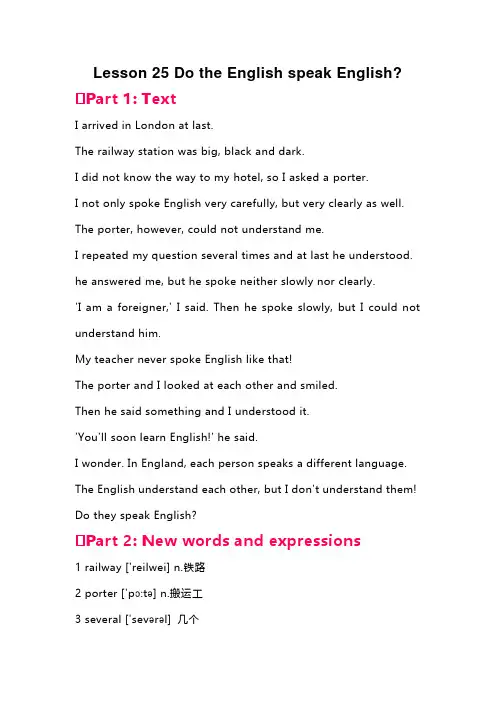
Lesson 25 Do the English speak English?Part 1: TextI arrived in London at last.The railway station was big, black and dark.I did not know the way to my hotel, so I asked a porter.I not only spoke English very carefully, but very clearly as well. The porter, however, could not understand me.I repeated my question several times and at last he understood. he answered me, but he spoke neither slowly nor clearly.'I am a foreigner,' I said. Then he spoke slowly, but I could not understand him.My teacher never spoke English like that!The porter and I looked at each other and smiled.Then he said something and I understood it.'You'll soon learn English!' he said.I wonder. In England, each person speaks a different language. The English understand each other, but I don't understand them! Do they speak English?Part 2: New words and expressions1 railway ['reilwei] n.铁路2 porter ['pɔ:tə] n.搬运工3 several ['sevərəl] 几个4 foreigner['fɔrinə] n.外国人5 wonder ['wʌndə] v.感到奇怪★ railway n. rail(铁路)+way(路,途径)rail 扶手,栏杆,围栏jump the rail 出轨stair rails 楼梯的扶手ride the rails 逃火车票railway/railroad station:火车站火车站很大,又黑又暗。
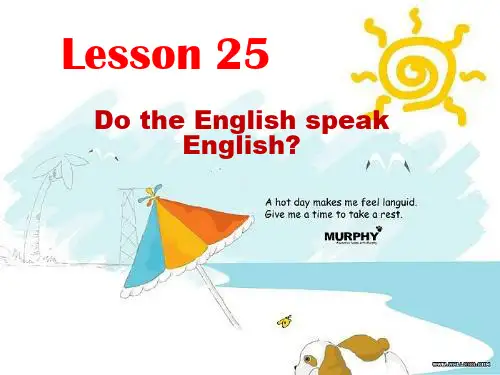
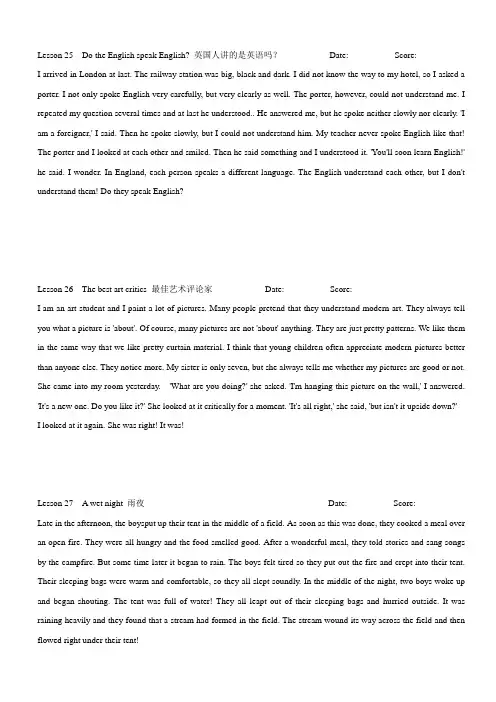
Lesson 25 Do the English speak English? 英国人讲的是英语吗?Date:__________ Score:___________ I arrived in London at last. The railway station was big, black and dark. I did not know the way to my hotel, so I asked a porter. I not only spoke English very carefully, but very clearly as well. The porter, however, could not understand me. I repeated my question several times and at last he understood.. He answered me, but he spoke neither slowly nor clearly. 'I am a foreigner,' I said. Then he spoke slowly, but I could not understand him. My teacher never spoke English like that! The porter and I looked at each other and smiled. Then he said something and I understood it. 'You'll soon learn English!' he said. I wonder. In England, each person speaks a different language. The English understand each other, but I don't understand them! Do they speak English?Lesson 26 The best art critics 最佳艺术评论家Date:__________ Score:___________I am an art student and I paint a lot of pictures. Many people pretend that they understand modern art. They always tell you what a picture is 'about'. Of course, many pictures are not 'about' anything. They are just pretty patterns. We like them in the same way that we like pretty curtain material. I think that young children often appreciate modern pictures better than anyone else. They notice more. My sister is only seven, but she always tells me whether my pictures are good or not. She came into my room yesterday. 'What are you doing?' she asked. 'I'm hanging this picture on the wall,' I answered. 'It's a new one. Do you like it?' She looked at it critically for a moment. 'It's all right,' she said, 'but isn't it upside down?' I looked at it again. She was right! It was!Lesson 27 A wet night 雨夜Date:__________ Score:___________ Late in the afternoon, the boysput up their tent in the middle of a field. As soon as this was done, they cooked a meal over an open fire. They were all hungry and the food smelled good. After a wonderful meal, they told stories and sang songs by the campfire. But some time later it began to rain. The boys felt tired so they put out the fire and crept into their tent. Their sleeping bags were warm and comfortable, so they all slept soundly. In the middle of the night, two boys woke up and began shouting. The tent was full of water! They all leapt out of their sleeping bags and hurried outside. It was raining heavily and they found that a stream had formed in the field. The stream wound its way across the field and thenLesson 28 No parking 禁止停车Date:__________ Score:___________ Jasper White is one of those rare people who believes in ancient myths. he has just bought a new house in the city, but ever since he moved in, he has had trouble with cars and their owners. When he returns home at night, he always finds that someone has parked a car outside his gate. Because of this, he has not been able to get his own car into his garage even once. Jasper has put up 'No Parking' signs outside his gate, but these have not had any effect. Now he has put an ugly stone head over the gate. It is one of the ugliest faces I have ever seen. I asked him what it was and he told me that it was Medusa, the Gorgon. Jasper hopes that she will turn cars and their owners to stone. But none of them has been turned to stone yet!Lesson 29 Taxi! 出租汽车Date:__________ Score:___________ Captain Ben Fawcett has bought an unusual taxi and has begun a new service. The 'taxi' is a small Swiss aeroplane called a 'Pilatus Porter'. This wonderful plane can carry seven passengers. The most surprising thing about it, however, is that it can land anywhere: on snow, water, or even on a ploughed field. Captain Fawcett's first passenger was a doctor who flew from Birmingham to a lonely village in the Welsh mountains. Since then, Captain Fawcett has flown passengers to many unusual places. Once he landed on the roof of a block of flats and on another occasion, he landed in a deserted car park. Captain Fawcett has just refused a strange request from a businessman. The man wanted to fly to Rockall, a lonely island in the Atlantic Ocean, but Captain Fawcett did not take him because the trip was too dangerous.Lesson 30 Football or polo? 足球还是水球?Date:__________ Score:___________ The Wayle is a small river that cuts across the park near my home. I like sitting by the Wayle on fine afternoons. It was warm last Sunday, so I went and sat on the river bank as usual. Some children were playing games on the bank and there were some people rowing on the river. Suddenly, one of the children kicked a ball very hard and it went towards a passing boat. Some people on the bank called out to the man in the boat, but he did not hear them. The ball struck him so hard that he nearly fell into the water. I turned to look at the children, but there weren't any in sight: they had all run away! TheLesson 31 Success story 成功者的故事Date:__________ Score:___________ Yesterday afternoon Frank Hawkins was telling me about his experiences as a young man. Before he retired, Frank was the head of a very large business company, but as a boy he used to work in a small shop. It was his job to repair bicycles and at that time he used to work fourteen hours a day. He saved money for years and in 1958 he bought a small workshop of his own. In his twenties Frank used to make spare parts for aeroplanes. At that time he had two helpers. In a few years the small workshop had become a large factory which employed seven hundred and twenty-eight people. Frank smiled when he remembered his hard early years and the long road to success. He was still smiling when the door opened and his wife came in. She wanted him to repair their grandson's bicycle!Lesson 32 Shopping made easy 购物变得很方便Date:__________ Score:___________ People are not so honest as they once were. The temptation to steal is greater than ever before -- especially in large shops.A detective recently watched a well-dressed woman who always went into a large store on Monday mornings. One Monday, there were fewer people in the shop than usual when the woman came in, so it was easier for the detective to watch her. The woman first bought a few small articles. After a little time, she chose one of the most expensive dresses in the shop and handed it to an assistant who wrapped it up for her as quickly as possible. Then the woman simply took the parcel and walked out of the shop without paying. When she was arrested, the detective found out that the shop assistant was her daughter. The girl 'gave' her mother a free dress once a week!Lesson 33 Out of the darkness 冲出黑暗Date:__________ Score:___________ Nearly a week passed before the girl was able to explain what had happened to her. One afternoon she set out from the coast in a small boat and was caught in a storm. Towards evening, the boat struck a rock and the girl jumped into the sea. Then she swam to the shore after spending the whole night in the water. During that time she covered a distance of eight miles. Early next morning, she saw a light ahead. She knew she was near the shore because the light was high up on the cliffs. On arriving at the shore, the girl struggled up the cliff towards the light she had seen. That was all she remembered. When she woke up a day later, she found herself in hospital.Lesson34 Quick work 破案“神速”Date:__________ Score:___________Ted Robinson has been worried all the week. Last Tuesday he received a letter from the local police. In the letter he was asked to call at the station. Ted wondered why he was wanted by the police, but he went to the station yesterday and now he is not worried any more. At the station, he was told by a smiling policeman that his bicycle had been found. Five days ago, the policeman told him, the bicycle was picked up in a small village four hundred miles away. It is now being sent to his home by train. Ted was most surprised when he heard the news. He was amused too, because he never expected the bicycle to be found. It was stolen twenty years ago when Ted was a boy of fifteen !Lesson 35 Stop thief! 捉贼!Date:__________ Score:___________Roy Trenton used to drive a taxi. A short while ago, however, he became a bus driver and he has not regretted it. He is finding his new work far more exciting. When he was driving along Catford Street recently, he saw two thieves rush out of a shop and run towards a waiting car. One of them was carrying a bag full of money. Roy acted quickly and drove the bus straight at the thieves. The one with the money got such a fright that he dropped the bag. As the thieves were trying to get away in their car, Roy drove his bus into the back of it. While the battered car was moving away, Roy stopped his bus and telephoned the police. The thieves' car was badly damaged and easy to recognize. Shortly afterwards, the police stopped the car and both men were arrested.Lesson 36 Across the Channel Date:__________ Score:___________Erna Hart is going to swim across the English Channel tomorrow. She is going to set out from the French coast at five o'clock in the morning. Erna is only fourteen years old and she hopes to set up a new world record. She is a strong swimmer and many people feel that she is sure to succeed. Erna's father will set out with her in a small boat. Mr Hart has trained his daughter for years. Tomorrow he will be watching her anxiously as she swims the long distancet o England. Erna intends to take short rests every two hours.She will have something to drink but she will not eat any solid food. Most of Erna's school friends will be waiting for her on the English coast. Among them will be Erna's mother, who swam the Channel herself when she was a girl.Lesson 37 The Olympic Games 奥林匹克运动会Date:__________ Score:___________ The Olympic Games will be held in our country in four years' time. As a great many people will be visiting the country, the government will be building new hotels, an immense stadium, and a fine new swimming pool. 'They will also be building new roads and a special railway-line. The Games will be held just outside the capital and the whole area will be called 'Olympic City'. Workers will have completed the new roads by the end of this year. By the end of next year, they will have finished work on the new stadium. The fine modern buildings have been designed by Kurt Gunter. Everybody will be watching anxiously as the new buildings go up. We are all very excited and are looking forward to the Olympic Games because they have never been held before in this country.Lesson 38 Everything except the weather Date:__________ Score:___________ my old friend, Harrison, had lived in the Mediterranean for many years before he returned to England. He had often dreamed of retiring in England and had planned to settle down in the country. He had no sooner returned than he bought a house and went to live there. Almost immediately he began to complain about the weather, for even though it was still summer, it rained continually and it was often bitterly cold. After so many years of sunshine, Harrison got a shock. he acted as if he had never lived in England before. In the end, it was more than he could bear. He had hardly had time to settle down when he sold the house and left the country. The dream he had had for so many years ended there. Harrison had thought of everything except the weather.39 Am I all right? Date:__________ Score:___________While John Gilbert was in hospital, he asked his doctor to tell him whether his operation had been successful, but the doctor refused to do so. The following day, the patient asked for a bedside telephone. When he was alone, he telephoned the hospital exchange and asked for Doctor Millington. When the doctor answered the phone, Mr Gilbert said he was inquiring about a certain patient, a Mr John Gilbert. He asked if Mr Gilbert's operation had been successful and the doctor told him that it had been. He then asked when Mr Gilbert would be allowed to go home and the doctor told him that he would have to stay in hospital for another two weeks. Then Dr Millington asked the caller if he was a relative of the patient.' No,' the patient answered,' I am Mr John Gilbert.'Lesson 40 Food and talk Date:__________ Score:___________Last week at a dinner party, the hostess asked me to sit next to Mrs. Rumbold. Mrs. Rumbold was a large, unsmiling lady in a tight black dress. She did not even look up when I took my seat beside her. Her eyes were fixed on her plate and in a short time, she was busy eating. I tried to make conversation.'A new play is coming to "The Globe" soon,' I said. 'Will you be seeing it?' 'No,' she answered.'Will you be spending your holidays abroad this year?' I asked. 'No,' she answered.'Will you be staying in England?' I asked. 'No,' she answered.In despair, I asked her whether she was enjoying her dinner.'Young man,' she answered, 'if you ate more and talked less, we would both enjoy our dinner!"Lesson 41 Do you call that a hat? Date:__________ Score:___________Do you call that a hat? 你把那个叫帽子吗?'Do you call that a hat?' I said to my wife.'You needn't be so rude about it,' my wife answered as she looked at herself in the mirror.I sat down on one of those modern chairs with holes in it and waited. We had been in the hat shop for half an hour and my wife was still in front of the mirror.'We mustn't buy things we don't need,' I remarked suddenly. I regretted saying it almost at once.'You needn't have said that,' my wife answered. 'I needn't remind you of that terrible tie you bought yesterday.''I find it beautiful,' I said. 'A man can never have too many ties.''And a woman can't have too many hats,' she answered.Ten minutes later we walked out of the shop together. My wife was wearing a hat that looked like a lighthouse!Lesson 42 Not very musical 并非很懂音乐Date:__________ Score:___________As we had had a long walk through one of the markets of old Delhi, we stopped at a square to have a rest. After a time, we noticed a snake charmer with two large baskets at the other side of the square, so we went to have a look at him. As soon as he saw us, he picked up a long pipe which was covered with coins and opened one of the baskets. When he began to play a tune, we had our first glimpse of the snake. It rose out of the basket and began to follow the movements of the pipe. We were very much surprised when the snake charmer suddenly began to play jazz and modern pop songs. The43 Over the South Pole Date:__________ Score:___________In 1929, three years after his flight over the North Pole, the American explorer,R. E. Byrd, successfully flew over the South Pole for the first time. Though, at first, Byrd and his men were able to take a great many photographs of the mountains that lay below, they soon ran into serious trouble. At one point, it seemed certain that their plane would crash. It could only get over the mountains if it rose to 10,000 feet. Byrd at once ordered his men to throw out two heavy food sacks. The plane was then able to rise and it cleared the mountains by 400 feet. Byrd now knew that he would be able to reach the South Pole which was 300 miles away, for there were no more mountains in sight. The aircraft was able to fly over the endless white plains without difficulty.44 Through the forest Date:__________ Score:___________ Mrs Anne Sterling did not think of the risk she was taking when she ran through a forest after two men. They had rushed up to her while she was having a picnic at the edge of a forest with her children and tried to steal her handbag. In the struggle, the strap broke and, with the bag in their possession, both men started running through the trees. Mrs Sterling got so angry that she ran after them. She was soon out of breath, but she continued to run. When she caught up with them,she saw that they had sat down and were going through the contents of the bag, so she ran straight at them. The men got such a fright that they dropped the bag and ran away. 'The strap needs mending,' said Mrs Sterling later, 'but they did not steal anything.Lesson 45 A clear conscience Date:__________ Score:___________The whole village soon learnt that a large sum of money had been lost. Sam Benton, the local butcher, had lost his wallet while taking his savings to the post office. Sam was sure that the wallet must have been found by one of the villagers, but it was not returned to him. Three months passed, and then one morning, Sam found his wallet outside his front door. It had been wrapped up in newspaper and it contained half the money he had lost, together with a note which said: 'A thief, yes, but only 50 per cent a thief!' Two months later, some more money was sent to Sam with another note: 'Only 25 perLesson 46 Expensive and uncomfortable 既昂贵又受罪Date:__________ Score:___________ When a plane from London arrived at Sydney airport, workers began to unload a number of wooden boxes which contained clothing. No one could account for the fact that one of the boxes was extremely heavy. It suddenly occurred to one of the workers to open up the box. He was astonished at what he found. A man was lying in the box on top of a pile of woolen goods. He was so surprised at being discovered that he did not even try to run away. After he was arrested, the man admitted hiding in the box before the plane left London. He had had a long and uncomfortable trip, for he had been confined to the wooden box for over eighteen hours. The man was ordered to pay $3,500 for the cost of the trip. The normal price of a ticket is $2,000!Lesson 47 A thirsty ghost嗜酒的鬼魂Date:__________ Score:___________A public housewhich was recently bought by Mr.Ian Thompson is up for sale. Mr.Thompson is going to sell it because it is haunted. He told me that he could not go to sleep one nightbecause he heard a strange noise coming from the bar. The next morning, he found that the doors had been blocked by chairs and the furniture had been moved. Though Mr.Thompson had turned the lights offbefore he went to bed, they were on in the morning. He also said that he had found five empty whiskybottles which the ghostmust have drunk the night before. When I suggested that some villagers must have come in for a free drink, Mr.Thompson shook his head. The villagers have told him that they will not accept the pub even if he gives it away.Lesson 48 Did you want to tell me something? 你想对我说什么吗?Date:__________ Score:___________ Dentists always ask questions when it is impossible for you to answer. My dentist had just pulled out one of my teeth and had told me to rest for a while. I tried to say something, but my mouth was full of cotton wool. He knew I collected match boxes and asked me whether my collection was growing. He then asked me how my brother was and whether I liked my new job in London. In answer to these questions I either nodded or made strange noises. Meanwhile, my tongue was busy searching out the holewhere the tooth had been. I suddenly felt very worried, but could not say anything. When the。
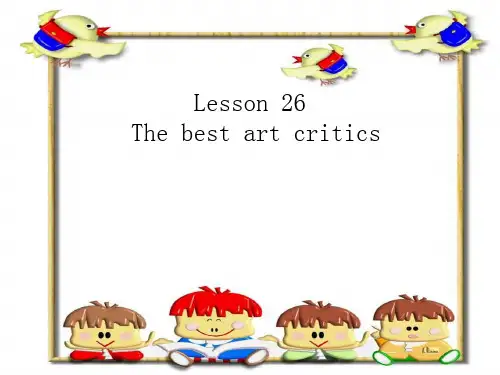
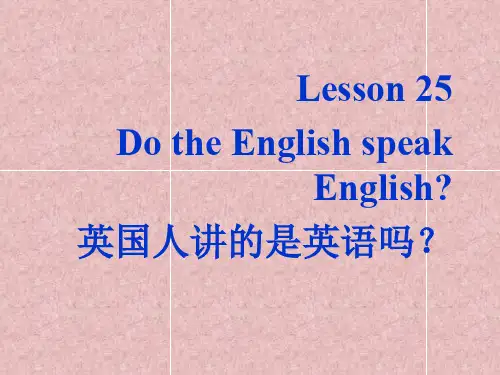
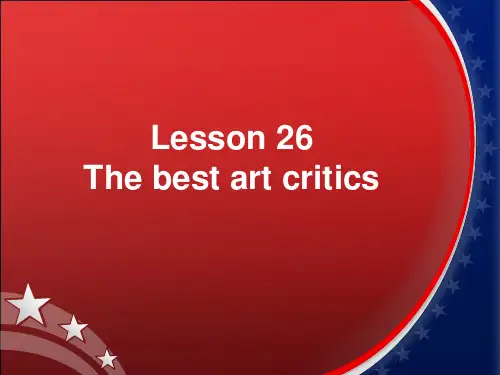
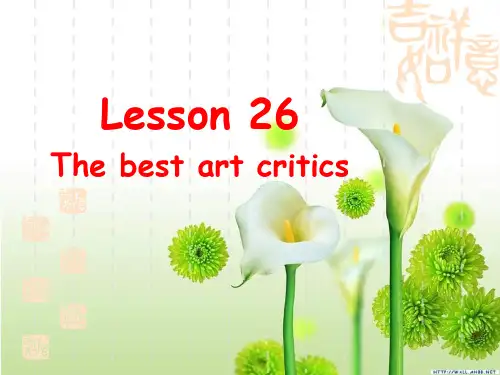
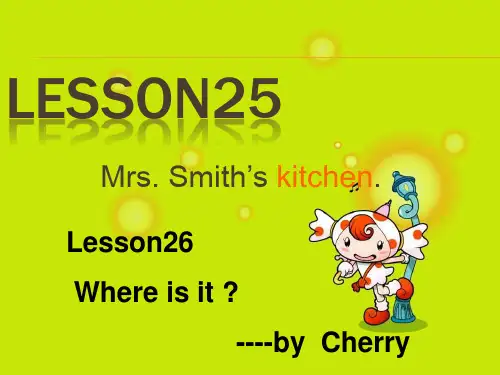
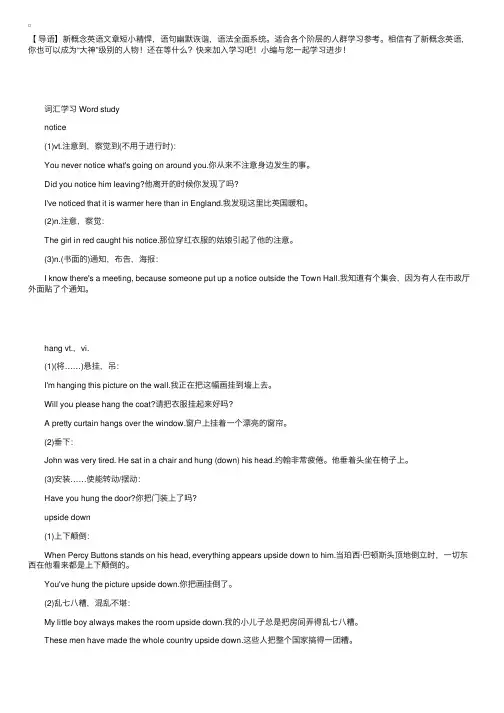
【导语】新概念英语⽂章短⼩精悍,语句幽默诙谐,语法全⾯系统。
适合各个阶层的⼈群学习参考。
相信有了新概念英语,你也可以成为“⼤神”级别的⼈物!还在等什么?快来加⼊学习吧!⼩编与您⼀起学习进步! 词汇学习 Word study notice (1)vt.注意到,察觉到(不⽤于进⾏时): You never notice what's going on around you.你从来不注意⾝边发⽣的事。
Did you notice him leaving?他离开的时候你发现了吗? I've noticed that it is warmer here than in England.我发现这⾥⽐英国暖和。
(2)n.注意,察觉: The girl in red caught his notice.那位穿红⾐服的姑娘引起了他的注意。
(3)n.(书⾯的)通知,布告,海报: I know there's a meeting, because someone put up a notice outside the Town Hall.我知道有个集会,因为有⼈在市政厅外⾯贴了个通知。
hang vt.,vi. (1)(将……)悬挂,吊: I'm hanging this picture on the wall.我正在把这幅画挂到墙上去。
Will you please hang the coat?请把⾐服挂起来好吗? A pretty curtain hangs over the window.窗户上挂着⼀个漂亮的窗帘。
(2)垂下: John was very tired. He sat in a chair and hung (down) his head.约翰⾮常疲倦。
他垂着头坐在椅⼦上。
(3)安装……使能转动/摆动: Have you hung the door?你把门装上了吗? upside down (1)上下颠倒: When Percy Buttons stands on his head, everything appears upside down to him.当珀西·巴顿斯头顶地倒⽴时,⼀切东西在他看来都是上下颠倒的。
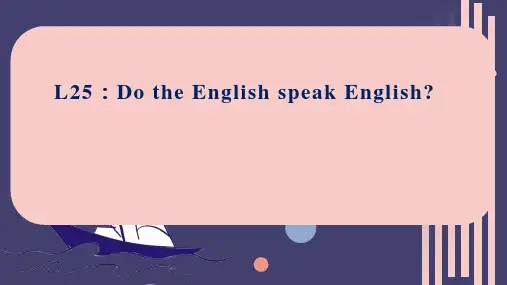
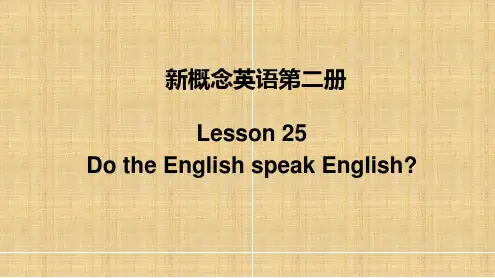
Lesson26单词讲解1.paint v.画,在…...上涂油漆,涂抹paint+pictures/a housen.涂料,油漆,化妆品painting n.油画,水彩画,绘画艺术2.appreciate v.鉴赏,欣赏;感激,感谢appreciate modern picturesI really appreciate your help.~+doing sth.3.hang v.悬挂,吊(hung,hung)hang this picture on the wall绞死,上吊(hanged,hanged) We must all hang together,or assuredly we shall all hang separately.--Benjamin FranklinLesson26课文&语法讲解宾语从句一般现在时/现在进行时宾语从句含义:宾语从句写法:陈述句变宾语从句?宾语从句写法:陈述句变宾语从句?You are right.I know(that)you are right宾语从句写法:陈述句变宾语从句?They understand modern art.Many people pretend(that)they understand modern art.宾语从句写法:特殊疑问句变宾语从句?What is a picture'about'?They always tell you what a picture is'about'宾语从句写法:一般疑问句变宾语从句?Are my pictures good or not?She always tells me whether/if my pictures are good or not宾语从句写法:1.Many people pretend that they understand modern art.2.They always tell you what a picture is'about'.3.She always tells me whether my pictures are good or not.练习宾语从句连接词+陈述句我承诺我会帮助你。
新概念英语第二册第25课:Do the English speak English?Lesson 25 Do the English speak English?英国人讲的是英语吗?First listen and then answer the question.听录音,然后回答以下问题。
Why does the writer not understand the porter?I arrived in London at last. The railway station was big, black and dark.我终于到了伦敦。
火车站很大,又黑又暗I did not know the way to my hotel, so I asked a porter. I not only spoke English very carefully, but very clearly as well.我不知道去旅馆的路该怎么走,于是向一个搬运工打听。
我的英语讲得不但非常认真,而且咬字也非常清楚The porter, however, could not understand me. I repeated my question several times and at last he understood.然而搬运工却不明白我的话。
我把问话重复了很多遍。
他终于听懂了he answered me, but he spoke neither slowly nor clearly. I am a foreigner, I said.他回答了,但他讲得既不慢也不清楚。
“我是个外国人,”我说Then he spoke slowly, but I could not understand him. My teacher never spoke English like that!于是他说得慢了,可我还是听不懂。
Lesson 25 单词讲解1.railway n. 铁路railway stationrailway linerailway transport2.porter n. 搬运工3.several [quantifier] 几个several timesI visited him in London several times.several peopleSeveral people have volunteered to go.The bill came to several hundred pounds.Several of her friends agreed with her decision.4.foreigner n. 外国人foreign adj. 外国的,外国人的a foreign languageCan you speak any foreign languages?TOEFL = Test Of English as a Foreign Language5.wonder v. 感到奇怪;怀疑=feel surprised;want to knowI wondered what that noise was.What are they going to do now, I wonder ?I wonder how James is getting on.I was wondering if I could borrow your car?Lesson 25 课文&语法讲解Do the English speak English?I arrived in London at last. The railway station was big, black and dark. I did not know the way to my hotel, so I asked a porter. I not only spoke English very carefully, but very clearly as well. The porter, however, could not understand me. I repeated my question several times and at last he understood. he answered me, but he spoke neither slowly nor clearly. I am a foreigner, I said. Then he spoke slowly, but I could not understand him. My teacher never spoke English like that! The porter and I looked at each other and smiled. Then he said something and I understood it. You'll soon learn English! he said. I wonder. In England, each person speaks a different language. The English understand each other, but I don't understand them! Do they speak English?1.I arrived in London at last.arrive in + 某一个大地点的里面(由不同部分组成的,如:Country, State/Province, City, County/District, Town)arrive at + 某一个小地点(可以视为整体的地点,如Village, Station, Airport, School, Hotel, Hospital. etc) arrive on + the scene(现场)at last = in the end, finally, eventually2.The railway station was big, black and dark.black 表示颜色黑dark 表示光线的暗3.I did not know the way to my hotel, so I asked a porter.SO:因果关系连接词句子的分类(按照结构划分):简单句:表述的是一件事,需要一个主语和一个谓语并列句:由两个或更多独立的主谓结构的简单句并列在一起的称为并列句;两个独立的句子之间要有意义上的关联(否则是两个独立的句子)。
要在句子之间加连接词:(n. + v.) + (conj.) + (n. + v.) + (conj.) + (n. + v.) 并列句的独有特点:相同的可以省略,其余的可以保持不变。
转折的并列连词:BUT转折:but;yetIt is summer, but it is very cold.I don't eat much, yet I am a size 16(XL).AND顺接:and,both...and...; not only...but...as well;not only...but also...;not only...but...Jim worked hard in college and later he became an architect.Tonight Mary will both sing and dance.Not only did he speak more correctly, but he spoke more easily.Both she and Sophia were pleased with the girl.OR 选择:either...or...(二选一);neither...nor...(两者都不选,本身否定)You must hurry up, or you won't make it for the train.Either you improve your work or I shall dismiss you.He spoke neither English nor German.SO因果:so,(因此);for(因为); 还有therefore(副词,因此)It must have rained in the night for when I woke up the next morning I saw the grass was wet. She asked me to go, so I went.It rained; therefore the game was called off.练习:I ran to the station. I missed the bus.They walked into the room. They sat down.She is very beautiful. She is very smart.He cannot read. He cannot write.4.I not only spoke English very carefully, but very clearly as well.not only...but...as well.5.The porter, however, could not understand me. I repeated my question several times and at lasthe understood.however: adv. 然而,不过,但是。
可以充当转折连词作用,要注意需要加逗号。
This is a cheap and simple process. However, there are dangers.6.he answered me, but he spoke neither slowly nor clearly.neither...nor...既不...也不...7.I am a foreigner, I said. Then he spoke slowly, but I could not understand him. My teacher neverspoke English like that!like that:like:prep. 像......一样。
look like;be likeHer hair is dark brown like mine.The garden looked like a jungleA club should be like a big family.If you receive a request like this, you cannot fail to obey it!8.The porter and I looked at each other and smiled. Then he said something and I understood it.You'll soon learn English! he said.soon:adv. 很快地It will be dark soonDavid arrived sooner than I expected.9.I wonder. In England, each person speaks a different language. The English understand eachother, but I don't understand them! Do they speak English?accent:口音Lesson 26 单词讲解1.art n. 艺术art moviea work of artmodern art=the art of conversation2.critic n. 评论家music criticart critic3.paint v. 画,上色The little boy paints well.paint a picturepaint a landscapeWe painted the door blue.Painting n. 绘画Oil Painting 油画4.pretend v. 假装Tom pretended illness.Tom pretended to be ill.Tom pretended that he was ill.We can’t go on pretending that everything is OK.Cathy pretended not to know me.5.pattern n. 图案a checkered patternThe girl wears a dress with a pattern of flowers on it.6.curtain n. 窗帘, 幕布draw the curtaina shower curtain7.material n. 材料building materialsThere is enough material for a dress.collect material for an article ([U], 资料)8.appreciate v. 鉴赏;感激;领会appreciate English poetryappreciate good wineappreciate oil paintingsHer abilities are not fully appreciated by her employer.Peter stood by me when I most needed it. I'll always appreciate that.9.noticev. 注意到I didn’t notice him coming in / come in.Did you notice him leaving the party early?I noticed that he was a little upset.Have you noticed any change in him?I noticed that her hands were shaking.These clothes will get you noticed and enhance your image.n. 通知Notices in the waiting room requested that you neither smoke nor spit.10.whether conj. 是否weather n. 天气Tell me whether you agree with us or not.I wondered whether to go or to stay.11.hang v. 悬挂, 吊(hung, hung)hang the coat on the hookhang the picture on the wallhang the windows with curtains12.critically adv. 批评地We should examine our work critically.13.upside down 上下颠倒The painting was hung upside down.inside out 翻过来; 里在外He was wearing the shirt inside out.Lesson 26 课文&语法讲解Key Points:宾语从句;一般现在时/现在进行时The best art criticsI am an art student and I paint a lot of pictures. Many people pretend that they understand modernart. They always tell you what a picture is 'about'. Of course, many pictures are not 'about' anything. They are just pretty patterns. We like them in the same way that we like pretty curtain material. I think that young children often appreciate modern pictures better than anyone else. They notice more. My sister is only seven, but she always tells me whether my pictures are good or not. She came into my room yesterday.'What are you doing?' she asked.'I'm hanging this picture on the wall,' I answered. 'It's a new one. Do you like it?'She looked at it critically for a moment. 'It's all right,' she said, 'but isn't it upside down?'I looked at it again. She was right! It was!宾语从句1.含义:句子做宾语的成分——主语+谓语动词+宾语从句2.写法:1)陈述句变宾语从句:that在此不做成分可以省略(考试中最好保留)I know . (you are right)= I know (that) you are right.Many people pretend . (they understand modern art.)= Many people pretend that they understand modern art.I know(that)you'll succeed.2)特殊疑问句变宾语从句(What, which, when, where, who, why, how等)They always tell you . (What is a picture "about"?)= They always tell you what a picture is 'about'.注意:调整语序,疑问句语序变为陈述句语序,谓语动词或系动词要放在主语后3)一般疑问句变宾语从句(yes or no)一般疑问句:由系动词be或其他助动词she always tells me . (Are my pictures good or not?)= she always tells me whether my pictures are good or not.注意:先调整语序,be动词或助动词放在主语后,然后要保留原句“是否”的含义,加whether或者ifI wonder if you could stay for another day.3.总结:宾语从句的从句都是正常的陈述句,从句之前都需要一个连接词:连接词+陈述句;根据从句中缺少的部分加连接词,不缺则用that。